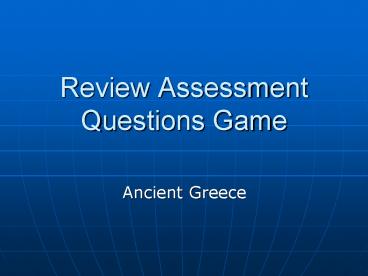Review Assessment Questions Game - PowerPoint PPT Presentation
1 / 42
Title:
Review Assessment Questions Game
Description:
Review Assessment Questions Game Ancient Greece The myth about the founding of the city of Rome stated that Romulus and Remus were raised by wolves. – PowerPoint PPT presentation
Number of Views:228
Avg rating:3.0/5.0
Title: Review Assessment Questions Game
1
Review Assessment Questions Game
- Ancient Greece
2
The myth about the founding of the city of Rome
stated that Romulus and Remus were raised by
wolves. Romulus killed Remus. Romulus became king
of the city, called Rome.
- This is ancient myth about the founding of the
city of Rome.
3
How did the geography of Greece affect how they
lived?
4
Answer
- They ended up living in isolated villages.
- The steep mountains separated them from each
other and made travel difficult.
5
List four effects caused by poor farmland, no
river source, and an increased population in
Greece?
- 1.
- 2.
- 3.
- 4.
6
Answer They had to trade to what to get what
they needed
- People had only small farms and had to build
earth steps into the hills to plant crops. - They grew crops that needed less land, such as
grapes and olives. - They raised goats and sheep for grazing and other
products - Due to shortage of farmland, some Greek
settlements had wars - Some Greeks set up colonies elsewhere in the
Mediterranean
7
Why were Greek colonies established and where?
8
Answer
- Colonies were settled in the Aegean, Black Sea,
and Mediterranean Sea areas. - Greek communities hoped they could grow more food
and trade for the resources they needed. - Population and food needs grew in Greece and
farmland was scarce.
9
What is a city-state?Why were they established
in Greece?
10
Answer
- Greek city-states had their own form of
government with laws, army, and its own money. - The city-states were established in Greece due to
the many mountains that physically divided
settlements and made it hard to communicate.
11
Why were Greek city-states separate?
12
Answer
- Mountains isolate each area.
- Therefore the city-states decided on their own
government and laws. - They were like separate countries.
- In common the same language,
- religion, and held the Olympics.
13
What is a monarchy?
- Who makes the laws?
14
Answer
- A monarchy has the ruling power in the hands of
one person, usually a king. - The king makes decisions on laws.
15
Who runs the government and makes the laws in a
monarchy?
16
Answer
- The king only
17
What is the name of the wealthy class of advisors
and landowners during the monarchy?
- Why did they want to take over the monarchy and
start an oligarchy?
18
Answer
- Aristocrats
- They realized, that as a group, they were
stronger than the king and eventually overthrew
the monarchy.
19
What is an Oligarchy
20
Answer
- In an oligarchy, the ruling power is in the hands
of a few.
21
What is tyranny?
- What is the difference between a king and a
tyrant?
22
Answer
- Tyranny is a form of government when the ruling
power is illegally seized from the current ruler
(s). - Control was usually taken by force.
- using the military.
23
What is the difference between tyranny and a
monarchy or a king and a tyrant?
- A tyrant obtained power by . . .
- A king . . . .
24
What is the difference betweendirect democracy
and representative democracy
25
Answer
- Athens Every citizen votes on every issue.
- In America People elect representatives to make
decisions and vote on laws.
26
What is the important result of the Persian Wars?
27
Answer
- Persians could not continue invading Europe
- Greeks regained their independence as a country.
28
How did Alexander help the Greek city-states
unite?
- He united them against a common enemyPersia
29
Answer
- Alexander conquered with kindness
- by allowing cities who surrendered to him, to
keep their own culture.
30
How did Alexander maintain his power in his
empire?
31
Answer
- He allowed leaders in government, but not as
military leaders.
32
How did Alexander use kindness to conquer his
empire?
33
What happened to Alexanders empire after he died?
34
What city is an example of how Alexander spread
Greek culture?
35
Where are the gods and godesses supposed to live
in Greece?
- What is the belief in many gods called?
36
The Greek love of sports shows . . .
37
Why were Greek outdoor theaters shaped like bowls?
38
What did Pythagoras do?
39
Who was Euclid?
40
Who was Socrates?
41
Think of architecture in Greece.In what way has
it influenced American architecture?
42
Describe how democracy in Greece influenced
democracy in American government.































